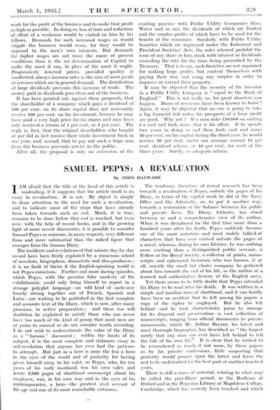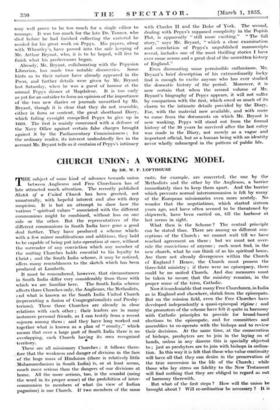SAMUEL PEPYS : A REVALUATION
By JOHN HAYWARD
IAM afraid that the title at the head of this article is misleading, if it suggests that the article itself is an essay in revaluation. It is not. My object is simply to draw attention to the need for such a revaluation, and to indicate some of the steps that have already been taken towards such an end. Much, it is true, remains to be done before that end is reached, but even now, with the help of recent books, and in the growing light of more recent discoveries, it is possible to consider Samuel Pepys as someone, in many respects, very different from and more substantial than the naked figure that emerges from the famous Diary.
The incidents and revelations of that minute day-by-day record have been freely exploited by a numerous school Of novelists, biographers, dramatists and film-producers ; it is no fault of theirs if the English-speaking world is not Pepys-conscious. Further and more daring episodes, which Pepys, with the peculiar false modesty of the exhibitionist, could only bring himself to report in a strange polyglot language—an odd kind of cache-sear loosely strung together out of French, Spanish and Latin—are waiting to be published in the first complete and accurate text of the Diary, which is now, after many promises, in active preparation ; and these too will doubtless be exploited to satisfy those who can never have too much of the kind of gossip that most men are at pains to conceal or do not consider worth recording. I do not wish to underestimate the value of the Diary as a " human " document ; within the limits of its subject, it is the most complete and elaborate essay in self-revelation that anyone has ever had the patience to attempt. But just as a hero is none the less a hero in the eyes of the world and of posterity for having given himself away to his valet, so Pepys, who, for ten years of his early manhood, was his own valet, and wrote 3,000 pages of shorthand manuscript about his employer, was, in his own way and in the eyes of his contemporaries, a hero—the greatest civil servant of his age and one of its most remarkable virtuosos. The tendency, therefore. of recent research has been towards a revaluation of Pepys, outside the pages of his Diary, in terms of the capital work he did at the Navy Office and the Admiralty, or, to put it another way, towards a restoration of the balance between his public and private lives. The Diary, hitherto, has stood between us and a comprehensive view of its author. When it was deciphered for the first time more than a hundred years after his death, Pepys suddenly became one of the most notorious and most widely talked-of characters that have ever existed outside the pages of a novel, whereas, during his own lifetime, he was nothing more exciting than a distinguished public servant, a Fellow of the Royal Society, a collector of prints, manu- scripts and ephemeral literature, who was known, if at all, outside the small but choice company he gathered about him towards the end of his life, as the author of a learned and authoritative history of the English navy.
Yet there seems to be little doubt that Pepys intended his Diary to be read after his death. It was written in a simple and familiar form of shorthand, and it can hardly have been an accident that he left among his papers a copy of the cipher he employed. But he also left behind-and he took characteristic pains to arrange for its disposal and preservation—a vast collection of manuscripts, ranging from official documents to private memoranda, which Mr. Arthur Bryant, his latest and most thorough biographer, has described as " the largest surely that any man can ever have left behind to tell the tale of his own life.' It is clear that he wished to be remembered as much, if not more, by these papers as by his private confessions, little suspecting that posterity would pounce upon the latter and leave the rest to lie undisturbed for the best part of another hundred years.
There is still a mass of material, relating to what may be called the post-Diary period, in the Bodleian at Oxford and in the Pepysian Library at Magdalene College, Cambridge, which has scarcely been touched and which may well prove to be too much for a single editor to manage: It was too much for the late Dr. Tanner, who died before he had finished collecting the material he needed for his great work on Pepys. His papers, along with Wheatley's, have passed into the safe keeping - of Mr. Arthur Bryant, who, it is to be hoped, will live to finish what his predecessors began.
Already, Mr. Bryant, collaborating with the Pepysian Librarian, has made two notable discoveries. Some hints as to their nature have already appeared in the Press, and further details were given by Mr. Bryant last Saturday, when he was a guest of honour at the -annual. Pepys dinner at Magdalene. It is too early as yet for an outsider to form an opinion of the importance of the two new diaries or journals unearthed by Mr. Bryant, though it is clear that they do not resemble, either in form or content, the great shorthand Diary, which failing eyesight compelled Pepys to give up in 1669. The first is mainly concerned with a defence of the Navy Office against certain false charges brought against it by the Parliamentary Commissioners ; for the ordinary reader, its interest undoubtedly lies in the account Mr. Bryant tells us it contains of Pepys's intimacy with Charles II and the Duke of York. The second, dealing with Pepys's supposed complicity in the Popish Plot, is apparently' still more exciting." " The full story," says Mr. Bryant, " which a close examination -and correlation of Pepys's unpublished manuscripts reveal, includes one of the- most thrilling stories I have ever come across and a great deal of the unwritten -history of England."
Even discounting some permissible enthusiasm, Mr. Bryant's brief description of his extraordinarily lucky find is enough to excite anyone who has ever studied the domestic history of the period. Moreover, it is now • certain that when the second volume of Mr. Bryant's biography of Pepys appears, it will not suffer by comparison with the first, which owed so much of its charm to the intimate details provided by the Diary. For, with the material now available, and with more to come from the doeuments on which Mr. Bryant is now working, Pepys will stand out from the formal history of the 30 years he survived after the last entry was made in the Diary, not merely as a vague and important official, but as a human being with an identity never wholly submerged in the pattern of public life.



























































 Previous page
Previous page